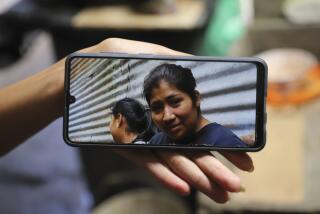Freeing Children of Convicts
- Share via
SHUNYI, China — When Han Enjing went to prison for helping to kill her husband, she left behind a 5-year-old daughter and a 2-year-old son. A villager took in the girl, but nobody wanted the boy. They suspected he might be illegitimate.
Then a local leader offered a $12 incentive and the village dwarf took him.
The dwarf “made me herd goats when I was just 3,” said Chen Xing, now 12 but so small and frail he looks no older than 8. “He beat me up every day. He used a hot iron pick from the fireplace to burn me in the head. I still have scars.”
Much of the world may see China as the country of “little emperors,” where children are spoiled rotten because of a one-child policy that turns them into rulers of their parents’ world. But that is far removed from the world inhabited by the 70 youngsters who live in the Children’s Village in this rural area on the outskirts of Beijing. They are here because they are the children of the imprisoned.
After two decades of economic reforms, the Chinese generally have better and freer lives. But they also have had to contend with a sharp rise in unemployment and social insecurity. Old vices from drug abuse to domestic violence have resurfaced.
One result has been soaring crime that also victimizes the children of the lawbreakers.
“In China, if a child’s parent is a martyr, people will transfer their admiration for the martyr to the child. If the child’s parent is a criminal, they will transfer their hatred for the criminal to the child, “ said Zhang Shuqin, a 53-year-old former correctional officer who runs this children’s home, her third.
Unlike in the West, China has no laws that require the state to care for children left behind by incarcerated adults, estimated at 300,000 annually. Nor can the children rely on friends or relatives in a culture that believes in guilt by family association. Some children drift from one abusive home to another; others wander the streets or become criminals themselves.
Zhang realized the scale of the problem while working at a large prison in her hometown in northern China’s Shanxi province. She opened the country’s first private shelter in 1996 to help youngsters abandoned by China’s booming prison population.
“I’ve seen children walk thousands of miles to visit their parents, and I’ve seen women break out of jail to see their kids, “ Zhang said. “One couple had five children on the outside. They didn’t even know when one had died and the others dropped out of school.”
The divorced mother of two grown children said she’s always had a soft spot for the deprived. She spent seven years working as a so-called barefoot doctor, a practitioner with limited training who walks from village to village delivering primitive healthcare.
“I was the only woman doctor in the surgery brigade,” Zhang said. “It was the height of China’s one-child policy movement. I performed countless abortions and hysterectomies. I helped women give birth in deplorable conditions. I often think to myself, maybe I destroyed too many little lives back then. I am making it up to them now.”
It is not easy to run a nonprofit in China. Philanthropy is still a foreign concept in a society that is new to personal wealth and unfamiliar with nongovernmental organizations. Every year, Zhang must raise at least $430 per child to cover food, school fees and other living expenses. About 60% of her funding comes as gifts from foreign enterprises and aid groups and the rest from Chinese donors.
The shelter also rents farmland where the children grow their own vegetables and tend thousands of date trees as well as about 100 ducks, chicken and pigs. In the summer, they bring the produce to market or sell it on the street. All those older than 10 help for four hours a week “so they understand that money doesn’t come easy,” Zhang said.
Her three campuses house about 200 children, some as young as 3. Zhang picks the neediest cases but turns down hundreds for lack of resources.
“In the end, we need the government’s help and we need the law to protect these kids,” she said. Zhang is hopeful that, in a changing China, it eventually will happen.
This Children’s Village, with its three rows of simple brick houses, was designed as a rural clinic. Zhang took a lease for 10 years, painted the walls green and white and filled the rooms with the laughter of children.
Most of the youngsters made it to this haven because their parents found kind prison officials who helped them. When possible, Zhang arranges prison visits and the occasional phone call so the children can tell their parents about their disciplined lives -- going to school, doing communal chores, washing their own clothes. They can explain that they sleep six to a room with children like themselves.
Among the youngsters are Bai Jie and Bai Jing, 10-year-old twins whose father is serving a 20-year sentence for robbery. Their mother was a drug addict who was in and out of detention since before they were born.
When the girls were 3, their mother came home from prison only to abandon them again.
“She wrote a note on a piece of cigarette wrapper and told us to walk straight and knock on the door of my third aunt,” said Bai Jie, sitting on the bottom level of a metal-framed bunk bed donated by a local prison. “The note said she was coming back Sunday. But she never came back.”
With no one to care for them, the twins were sent to live in the countryside with their grandfather, who kept them out of school so they could do farm chores.
“My grandfather used to whip us with a broom because we stayed out late playing,” Bai Jing said.
Three years ago, relatives learned of Zhang’s shelter. She visited the children to assess their situation and quickly brought them to their new home.
“Without Zhang nainai, we would still be there being beaten up by that old man,” said Bai Jie, who, like all the children, refers to Zhang as nainai, or “grandmother.”
Both girls should be in fifth grade now, but they are just in third. They love their new nainai and the matching clothes she saves for them when donations arrive. But they haven’t shaken the past.
“I miss my mother,” Bai Jing lamented.
“I don’t,” her sister retorted. “Even if she came back today we won’t go home with her. She might throw us away again.”
The girls don’t yet know that their mother died of an overdose, their teachers said. They haven’t had the heart to tell them.
But both girls have high hopes for their father. They have visited him four times since they came to Zhang’s shelter.
“When my father called ... he said if we studied hard in school, he could come out sooner,” Bai Jing said. “He’s a very good prisoner.”
Like the twins, 12-year-old Li Yanan is waiting.
“My dad killed two people in some business deal, but he accused my mom of killing them,” said the chubby girl with long bangs draping her face. “My dad was shot to death less than a year later. My mom got 18 years.” Her grandmother looked after her and her little sister until she died.
“Kids at school beat us because they say my mom’s a criminal,” Li said. “Old people are also bad to us. They say we are dirty.”
The children can stay in the shelter until they are 18 or their parents are released. But often Zhang allows them to remain longer, until their parents can get back on their feet.
Han Enjing, the mother of little Chen Xing, the boy nobody wanted, was a child bride who was abused by her husband. One day, she said, he tried to kill her with a butcher knife. When his brother tried to stop him, the men struggled and her husband was killed.
Han said she had been beaten so badly that she was unconscious during the fight. But she was accused of aiding the murder and sentenced to eight years.
“In the beginning I didn’t know what happened to my kids,” said Han, 38, who wrote to Zhang from prison and begged her to save her children. “When they found [Chen Xing] scarred and barely able to walk, I couldn’t believe he was my child. I was devastated. I didn’t see the point of living anymore.”
Although not mistreated, Han’s daughter, Chen Jun, now 15, was emotionally shattered by the events. She, too, was taken in by Zhang.
Once the children were safe, Han said, she found the motivation to work hard in prison. Six years later, she won an early release. “Inside, we had to knit sweaters, sew police uniforms, military camouflage, factory outfits and winter coats,” Han said. “I worked from 7 in the morning to 2 in the morning. I did it for my kids.”
For now, Han uses her skills to make and mend clothes in Zhang’s shelter. She also takes the graveyard shift once a week, waking the younger children up every two hours to go to the bathroom.
“I have nothing but gratitude for the Children’s Village,” she said. “Without them, I don’t know if I and my children would still be alive today.”
More to Read
Sign up for Essential California
The most important California stories and recommendations in your inbox every morning.
You may occasionally receive promotional content from the Los Angeles Times.













